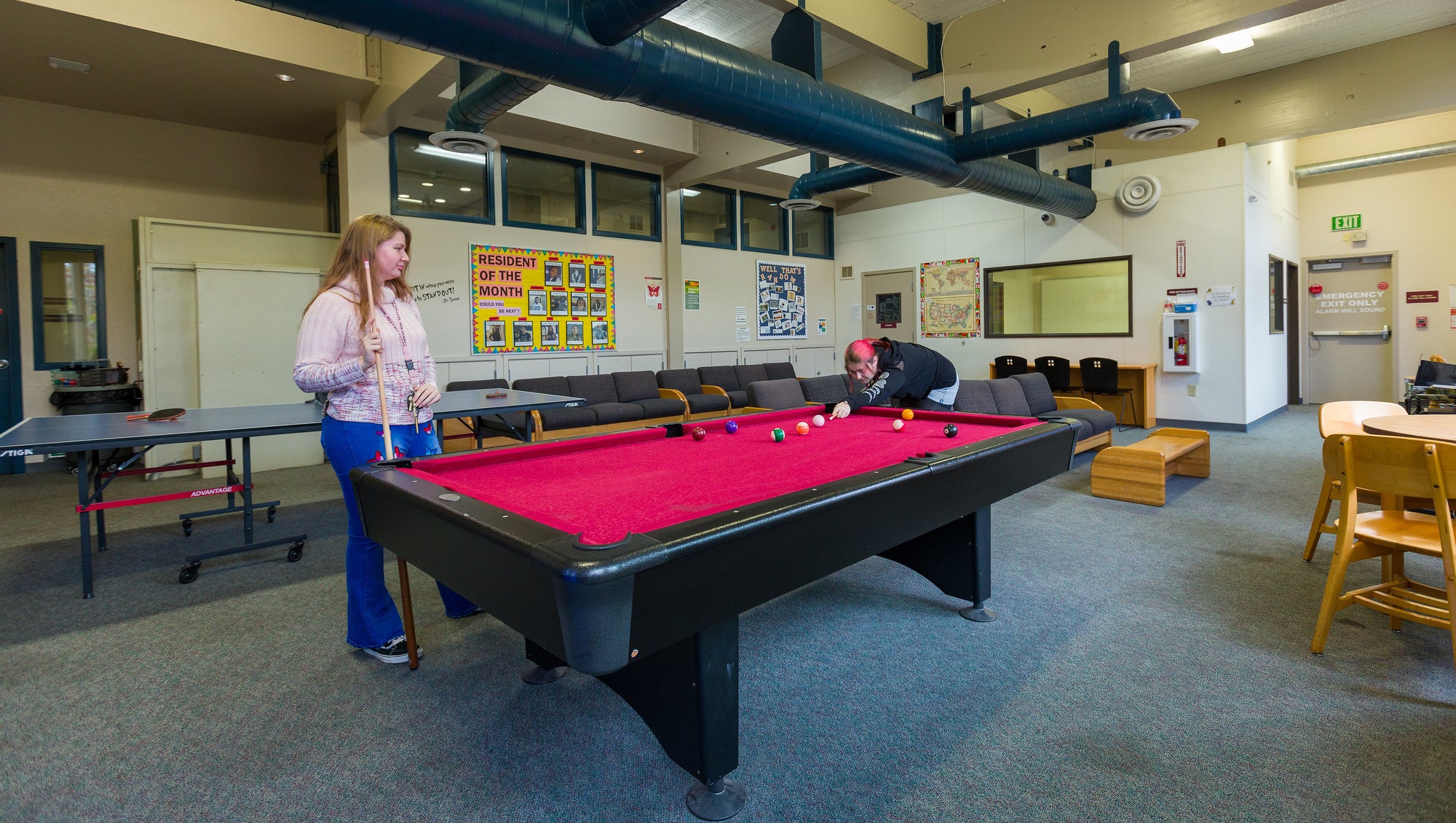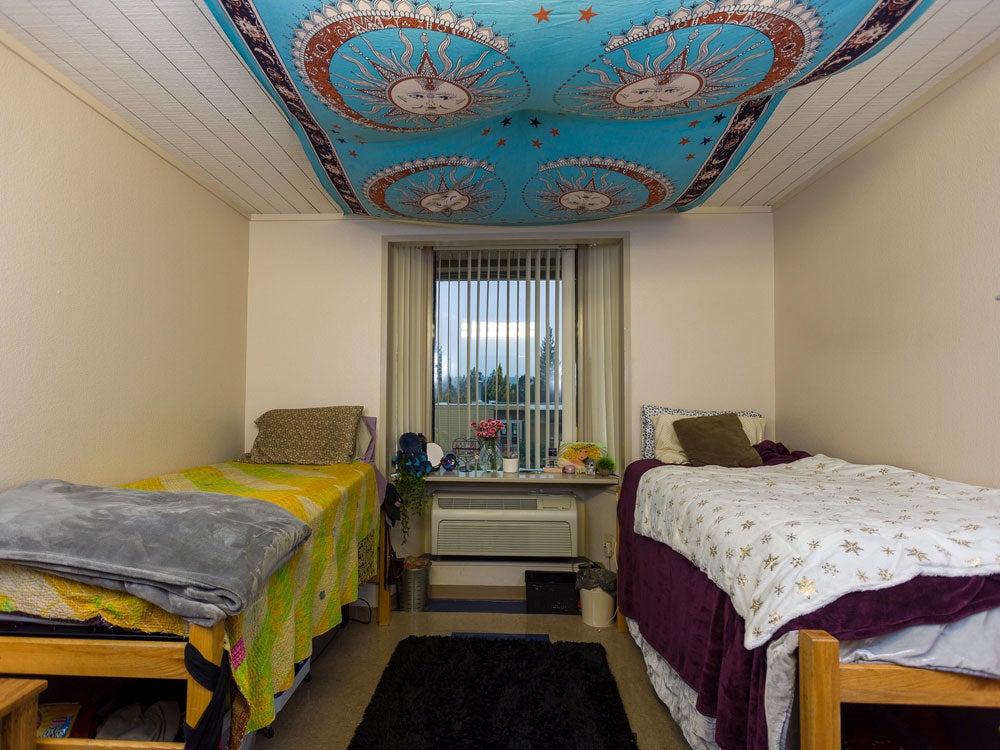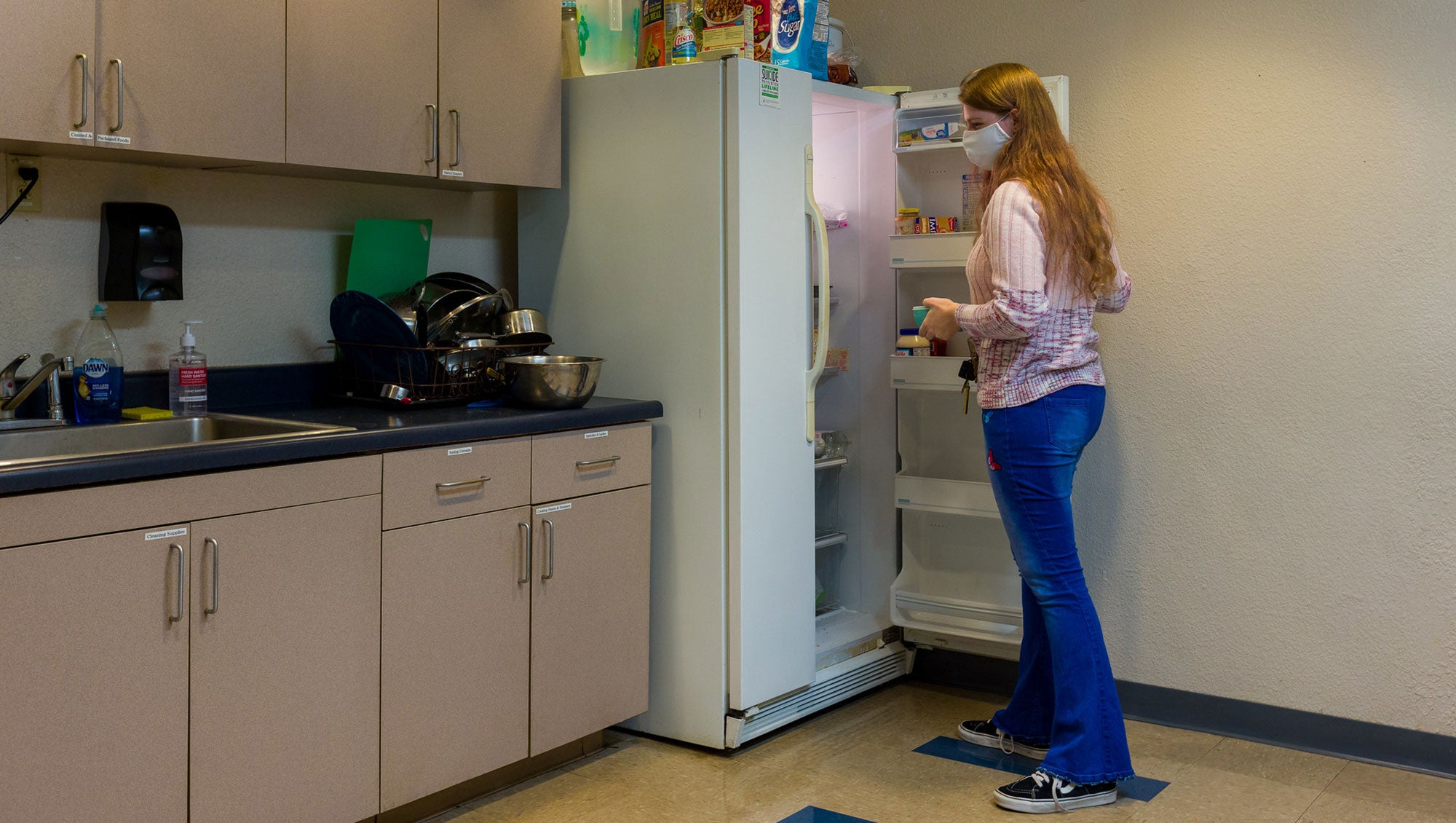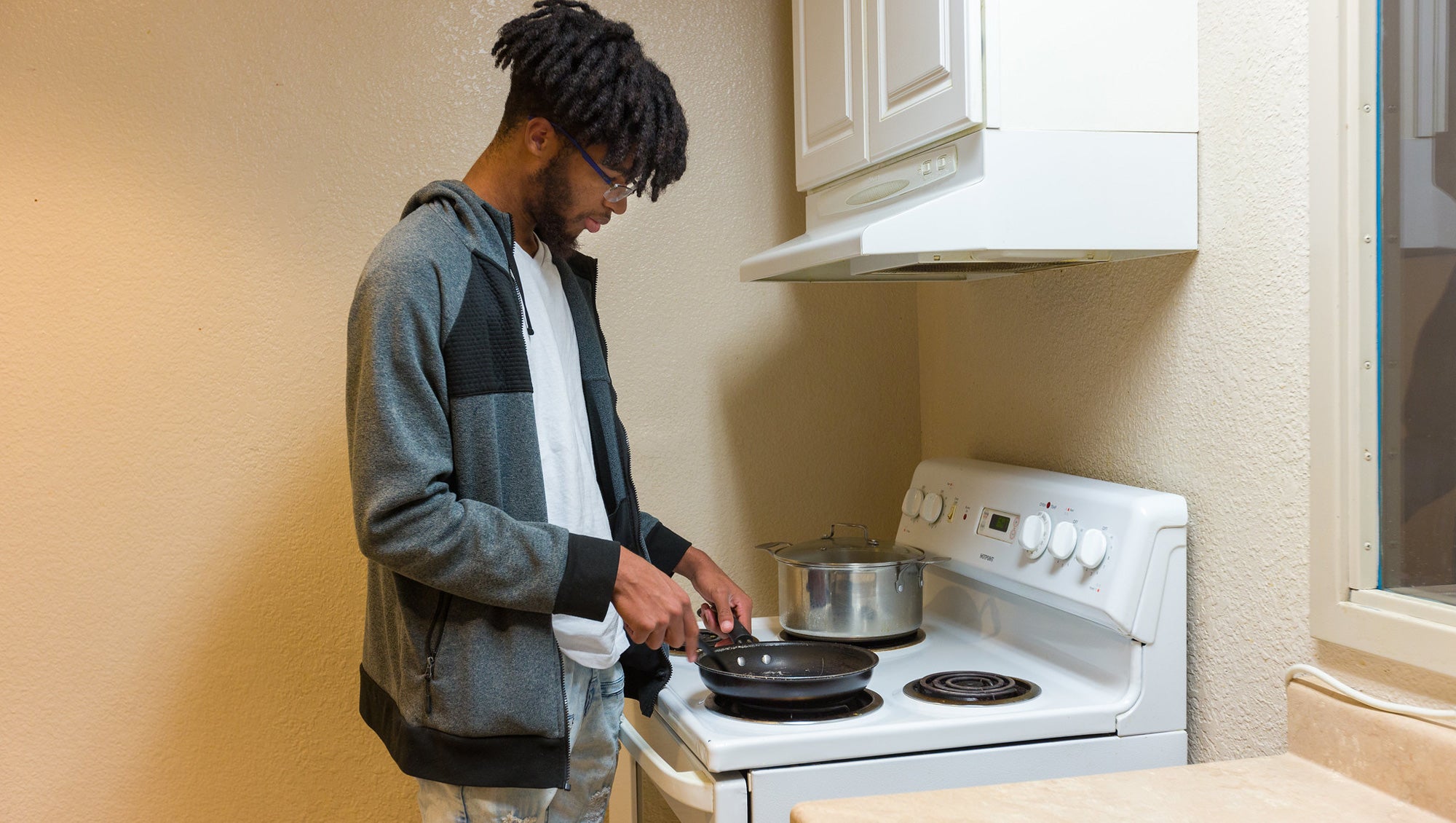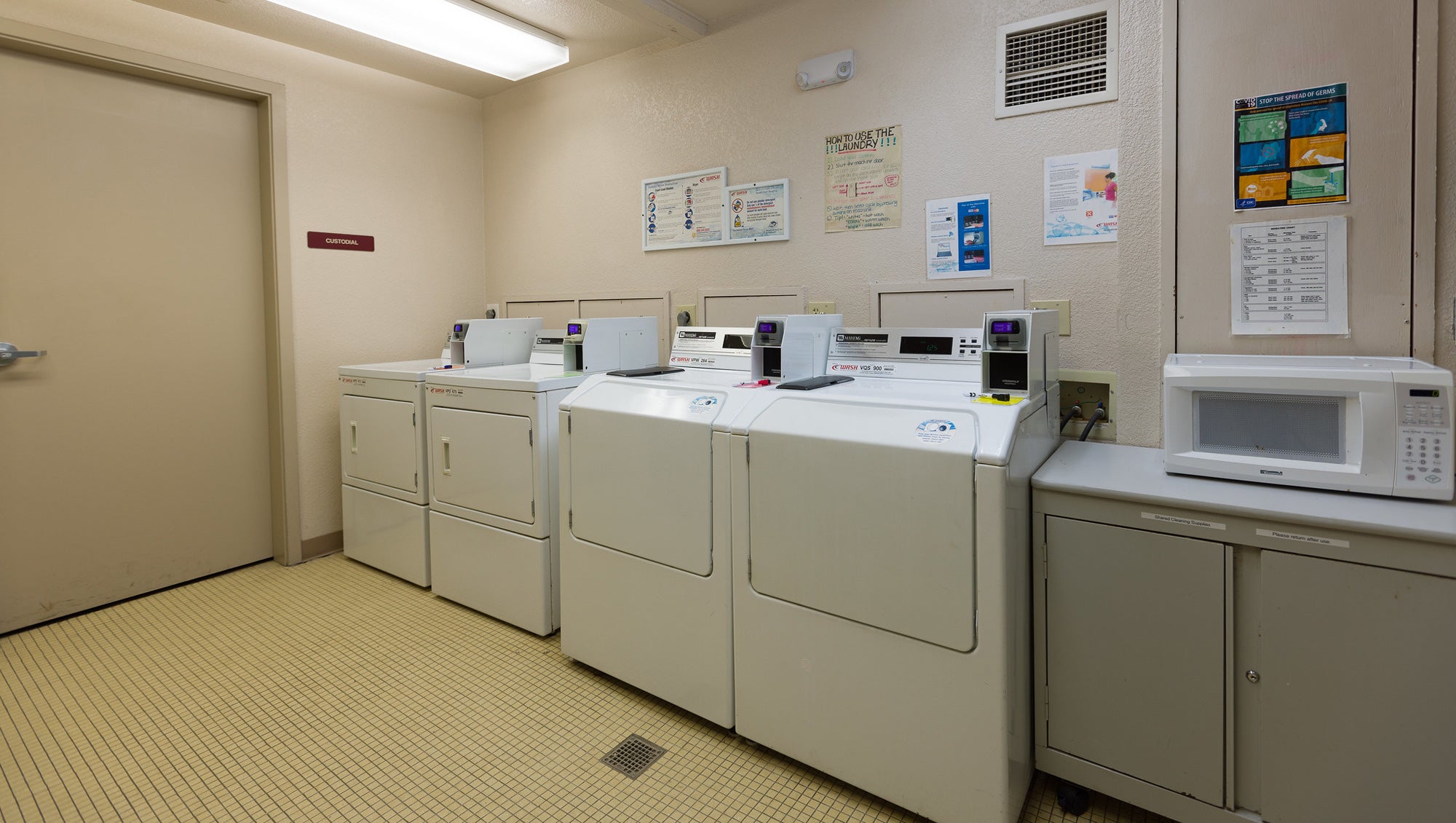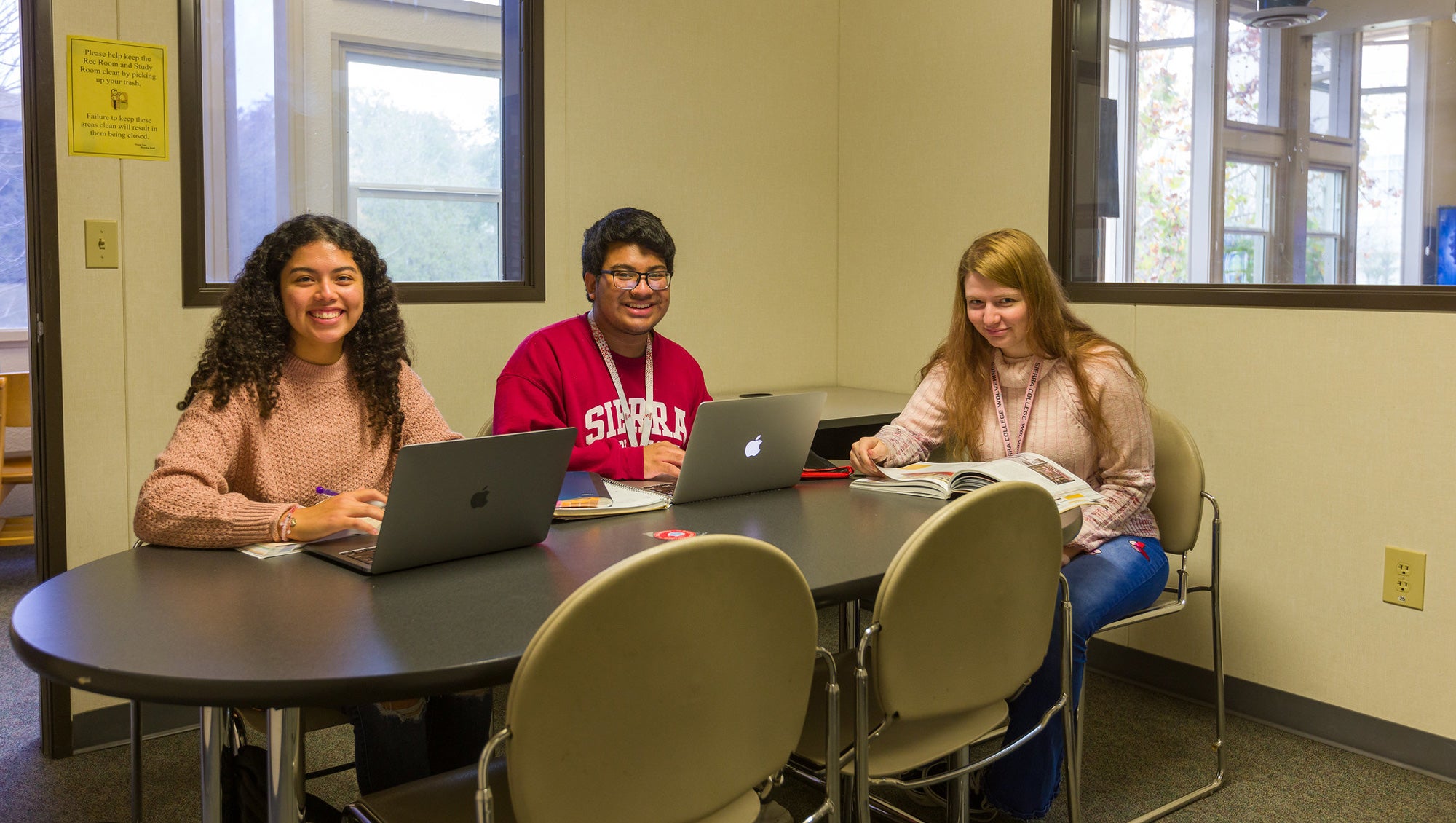Sierra College is committed to the full participation of students with disabilities in all aspects of college life, including residential life in the Residence Hall. Sierra College does not discriminate unlawfully in providing educational or employment opportunities to any qualified individual with disabilities. In accordance with Section 504 of the Rehabilitation Act of 1973 and Title II of the Americans with Disabilities Act of 1990, Sierra College has established housing procedures to ensure students with documented disability(ies) have equal access to housing opportunities at the Residence Hall.
Please Note:
- A requirement for students living on campus is to maintain enrollment in a minimum of 12 units at all times during the academic year. Only students who have a Reduced Unit Load Accommodation form submitted to the Residence Hall Office will be considered for an academic accommodation. A Reduced Unit Load form is to be completed by the students’ academic counselor for each semester a reduced unit load is recommended by the counselor. Students who need academic accommodation should contact their counselor to discuss their Educational Plan. Students seeking an academic accommodation due to a disability should contact the Student Accessibility Services (SAS) to seek services.
- This document is intended to cover the procedures for housing accommodations, including any other type of animal(s) other than a service animal. Service animals are defined as a working animal, individually trained to do work or perform tasks for the benefit of a student with a This procedure does not impose any limitations on service animals. For more information about service animals, please refer to Sierra College District Administrative Procedure 3925 (Service Animals).
Process for Requesting Reasonable Housing Accommodations
1. Submit Housing Accommodations Request Form
In order to request and receive housing accommodations, the student will need to complete the Housing Accommodations Request Form. The student is encouraged to promptly notify The Residence Hall of any condition and/or limitation that may impact their residential life experience. Housing accommodations are provided based on documented need and as space permits.
Deadlines for housing accommodations can be found under the application timeline. The Residence Hall Office encourages students to request housing accommodations as early as possible. Doing so will enable the Residence Hall to gain a clearer understanding of the accommodations requested, and the availability of suitable spaces and roommate matches.
Housing accommodation requests submitted after room assignments have been completed will be considered and reviewed as accommodations are needed, throughout the academic year. Housing options may be limited due to occupancy/resources in inventory.
2. Provide Confirmation of the Need for Accommodation
To determine reasonable housing accommodations, confirmation that describes the needed accommodation or modification, and the relationship between the student’s disability and how the requested accommodation is necessary to use campus housing is required. The student may provide information to establish their disability and needed accommodation without sharing specific diagnosis information.
All confirmations must be provided by a medical or mental health professional on official letterhead or otherwise verified, and address the following:
- Student’s name and student’s identification number (if available).
- Describe medical/mental health professional’s specialty, and how long the student has been in their care.
- Verify that the student has a qualifying disability that causes a substantial limitation of a major life activity.
- Identify the accommodation(s) the student needs.
- Describe the relationship between the student’s disability and how the requested accommodation or modification is necessary for them to fully access and participate in housing opportunities at The Residence Hall.
- Their signature or digital signature and license information or otherwise.
The student may be expected to participate in an interactive process with Residence Hall staff. Depending on the housing accommodations requested, additional documentation may be required to evaluate the request.
Housing accommodations may be approved on a temporary basis (for a particular semester or full academic year), or permanently through the student’s time at Sierra College. This determination is made on a case-by-case basis and will be communicated to the student at the time of initial approval.
3. Evaluation and Determination of Reasonable Accommodations
The Residence Hall strives to accommodate all reasonable requests for disability-related assistance. Reasonable housing accommodations are determined based on documented/verified medical and/or mental health need and are given consideration on a case-by-case basis.
The Residence Hall Accommodations Advisory Workgroup (RHAAW), in consultation with Student Accessibility Services and other Sierra College departments as needed, identifies appropriate housing accommodations for students with documented disabilities. This group meets as needed to review accommodation requests.
The student will be notified of the status of their request in writing. The Residence Hall may offer alternative reasonable accommodations and the student may be expected to participate in an interactive process. Depending on the housing accommodations requested, additional documentation may be required.
Under circumstances when the student is not amicable to accepting alternative accommodations offered by the Residence Hall, or if there are no alternative accommodations provided, the student will receive an explanation in writing of the reasons for denial of requested housing accommodations.
When the requested housing accommodations are determined unreasonable in nature, students will receive an explanation in writing of the reasons for denial of these housing accommodations. A housing accommodation may be considered unreasonable if it: (1) is not made by or on behalf of the student with a disability, or there is no disability-related need for the accommodation; (2) creates an undue financial or administrative burden; (3) results in a fundamental alteration of the Residence Hall facility, program or policies; (4) poses a direct threat to the health or safety of others in the Sierra College community, or would cause substantial damage to the Residence Hall; and/or (5) is deemed otherwise unreasonable to the operation of the Residence Hall.
If the Residence Hall cannot reasonably accommodate the student’s validly supported request for housing accommodations, the student will have the option to terminate their housing agreement/contract without incurring any penalties.
Students with disabilities are not responsible for paying a surcharge to cover the reasonable costs of accommodations/modifications that are needed to provide equal access to housing opportunities at the Residence Hall. Examples of requested housing accommodations for students related to disability need may include, but is not limited to, an accessible bathroom, additional space for medical equipment, automatic door opener, emotional support animal, ground floor room, lower occupancy room, requested roommate placement, semi-private bathroom access, specific building placement, strobe light fire alarm/smoke detector, and visual doorbell.
Requesting an Assistance Animal Other Than a Service Animal
The Residence Hall does not allow pets in campus housing; however, a student resident with a confirmed disability may request a reasonable accommodation of an assistance animal in housing when its use is necessary to afford a person with a disability an equal opportunity to use and enjoy their campus housing.
Assistance animals may include emotional support animal (ESA) or companion animal, which is an animal that provides emotional support or comfort for the benefit of a person with a disability and alleviates the effects of the disability. Exotic, wild, and agricultural animals are likely inappropriate as ESAs. Nothing in this procedure overrides federal, state, or local law restricting the possession of such animals.
ESAs may not be kept in campus housing without the approval from the Residence Hall. Students are encouraged to complete the Request Form and provide the request packet which includes the following:
- Housing Accommodations Request Form
- Confirmation of the need for accommodation, as outlined in Step 2 above
- Assistance Animal Owner/Handler Responsibilities: Once approved for an assistance animal as a reasonable housing accommodation, the student is responsible for any damages to property and for any injury caused by the assistance The student will be expected to review these responsibilities and sign the Assistance Animal Owner/Handler Responsibilities Form.
- Assistance Animal Registration: Once approved for an assistance animal as a reasonable housing accommodation, the student must provide animal registration and proof of vaccination from a veterinarian and sign the Assistance Animal Registration Form.
The Residence Hall will accept and consider a request for an ESA at any time; however, students anticipating making a request for an ESA are encouraged to complete the process prior to moving into campus housing and always before bringing any assistance animal onto campus. Based on roommate matching considerations, requests for accommodation for assistance animals are more likely to be granted promptly when requested more than 30 days before move-in.
An ESA may be brought into the student’s residence at the Residence Hall after the completion of the interactive process recommending the ESA as a reasonable housing accommodation. ESAs are not permitted in any other resident’s room or other campus buildings except for the student’s assigned housing space and common resident amenity spaces within the Residence Hall, where the student needs to be accompanied by the animal in order to fully use and enjoy the amenity space. An ESA must be under the control of, and is the sole responsibility of the student, who agrees that the animal will be well cared for at all times and must be properly contained or restrained when the student is not present. Under this procedure, an ESA may not be left alone or in the care of others overnight in campus housing or for any period exceeding 24 hours without prior approval from the Residence Hall Supervisor or designee.
If the student shares a residence, it is highly recommended the student have a conversation with their roommate(s) about bringing the animal to live in their shared campus housing. Please contact the Residence Hall as early as possible if any issues arise so that assistance can be provided.
A student with an approved ESA may be asked to remove the animal from the Residence Hall if the animal’s behavior or presence is unduly disruptive, poses a direct threat to the health or safety of others (for example, if it displays vicious or aggressive behavior toward people or other animals), causes substantial damage to the property of the Residence Hall or other individuals’ property, or fundamentally alters or creates an undue burden to the program, activity, or services of the Residence Hall or Sierra College.
A request for an ESA through this procedure will be primarily treated as a request for housing accommodations. A student making a request for an ESA as reasonable academic accommodation under Section 504 of the Rehabilitation Act of 1973 must apply and provide documentation to Student Accessibility Services.
In cases where the requested housing accommodations are not granted, the student is unwilling to accept alternative accommodations offered and/or the accommodations are determined unreasonable, the student has the right to file an appeal. Within ten (10) business days, the student must file a formal written request for an appeal within to the Dean of Student Services, Student Life.
The Dean of Student Services, Student Life will determine the composition of the hearing committee members and chair the appeal proceedings. Any decision made by the hearing committee and ratified by the Vice President of Student Services is final; there is no further right of appeal.
Additional Resources for Students with Disabilities
Student Accessibility Services (SAS) can assist students with disabilities with receiving accommodations in the classroom. Students seeking academic accommodations must complete the application and provide documentation to SAS. To learn more, contact SAS.


